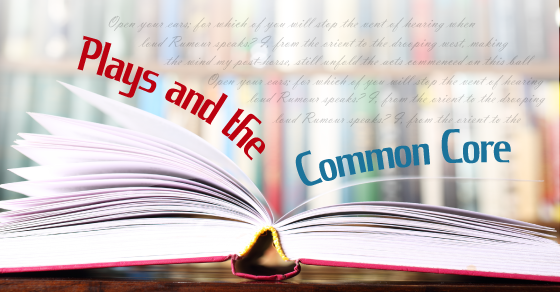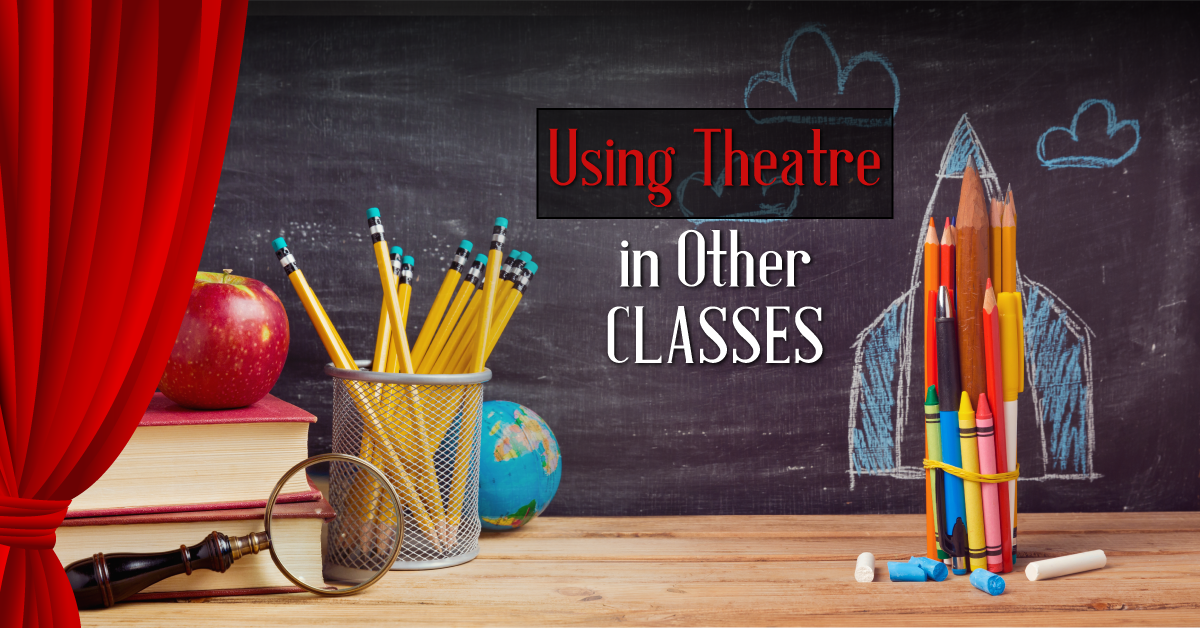Plays and the Common Core – a Perfect Fit
In an age of seemingly endless assessments of our students’ ability to critically read and analyze literature, there is a dire need for them to experience a variety of texts in a variety of formats in order for educators to better train them to get at the heart of what a writer is doing. Because of this, dramatic works fit perfectly into any curriculum attempting to tie the Common Core standards to what the students, at the end of the day, know and are able to do.
Of course, dramatic works are already mentioned in the Common Core as one genre with which our students should be interacting. But educators don’t always see them in the same light as more traditionally taught formats, like novels. It’s true that plays generally offer less student face-time with words than novels. However, they offer much more in the way of student engagement, unlike any other text-based medium. This significantly increases the likelihood of success in teaching them to see the literary techniques and authorial tricks-of-the-trade that the Common Core requires.
It’s one thing to read about something; it’s an entirely different thing to perform it.
The act of reading aloud, hearing the words, and portraying the ideas on the page makes clear what mere words cannot. It’s one thing to read about something; it’s an entirely different thing to perform it. Tone, theme, mood, inference, denotation/connotation, language use, structure, plot—all of this is present in plays and, to be sure, more easily seen by a “reader” because it’s literally seen by the reader.
With our school’s work with my play Stereotype High, we hit every single one of these elements during our production. We had on-going discussions about theme, character motivations, word choice, the interrelatedness of the scenes, allusions to other works, teen language, and any number of other text specific issues wherein understanding the work was at the core of the discussion.
As much as Stereotype High created multiple opportunities for students to explore all the standards of the Common Core, it’s not something specific to that particular play – it’s impossible to perform the words without interpreting them (and the characters saying them). And this is exactly why plays are a perfect fit with the Common Core.
With regard to the general reading of dramatic works in the classroom, the following Common Core standards apply (grade nine standards, although there is little difference between these standards and the ones two grade levels above and below):
Reading: Literary Text
CCSS.ELA-LITERACY.RL.9-10.1
Cite strong and thorough textual evidence to support analysis of what the text says explicitly, as well as inferences drawn from the text.
CCSS.ELA-LITERACY.RL.9-10.2
Determine the theme or central idea of a text and analyze in detail its development over the course of the text, including how it emerges and is shaped or refined by specific details; provide an objective summary of the text.
CCSS.ELA-LITERACY.RL.9-10.3
Analyze how complex characters (e.g., those with multiple or conflicting motivations) develop over the course of a text, interact with other characters, and advance the plot or develop the theme.
CCSS.ELA-LITERACY.RL.9-10.4
Determine the meaning of words and phrases as they are used in the text, including figurative and connotative meanings; analyze the cumulative impact of specific word choices on meaning and tone (e.g., how the language evokes a sense of time and place; how it sets a formal or informal tone).
CCSS.ELA-LITERACY.RL.9-10.5
Analyze how an author’s choices concerning how to structure a text, order events within it (e.g., parallel plots), and manipulate time (e.g., pacing, flashbacks) create such effects as mystery, tension, or surprise.
* CCSS.ELA-LITERACY.RL.9-10.7 *
Analyze the representation of a subject or a key scene in two different artistic mediums, including what is emphasized or absent in each treatment.
* CCSS.ELA-LITERACY.RL.9-10.9 *
Analyze how an author draws on and transforms source material in a specific work (e.g., how Shakespeare treats a theme or topic from Ovid or the Bible or how a later author draws on a play by Shakespeare).
*** These two are of particular importance as, since most teachers are already incorporating Shakespeare and Greek drama into their classrooms, these standards completely apply to modern adaptations. *****
Writing
Unlike most classical prose, plays inspire students to write plays. They’re shorter, more accessible, and tap into their authentic language so much more directly than any sort of prose can.
CCSS.ELA-LITERACY.W.9-10.3
Write narratives to develop real or imagined experiences or events using effective techniques, well-chosen details, and well-structured event sequences.
CCSS.ELA-LITERACY.W.9-10.3.A
Engage and orient the reader by setting out a problem, situation, or observation, establishing one or multiple point(s) of view, and introducing a narrator and/or characters; create a smooth progression of experiences or events.
CCSS.ELA-LITERACY.W.9-10.3.B
Use narrative techniques, such as dialogue, pacing, description, reflection, and multiple plot lines, to develop experiences, events, and/or characters.
CCSS.ELA-LITERACY.W.9-10.3.C
Use a variety of techniques to sequence events so that they build on one another to create a coherent whole.
CCSS.ELA-LITERACY.W.9-10.3.D
Use precise words and phrases, telling details, and sensory language to convey a vivid picture of the experiences, events, setting, and/or characters.
CCSS.ELA-LITERACY.W.9-10.3.E
Provide a conclusion that follows from and reflects on what is experienced, observed, or resolved over the course of the narrative.
Language
Unlike the printed word, plays provide a spoken tone (and, possibly, a physical action) to a word that may further help a student understand new language.
CCSS.ELA-LITERACY.L.9-10.4
Determine or clarify the meaning of unknown and multiple-meaning words and phrases based on grades 9-10 reading and content, choosing flexibly from a range of strategies.
CCSS.ELA-LITERACY.L.9-10.4.A
Use context (e.g., the overall meaning of a sentence, paragraph, or text; a word’s position or function in a sentence) as a clue to the meaning of a word or phrase.
CCSS.ELA-LITERACY.L.9-10.4.B
Identify and correctly use patterns of word changes that indicate different meanings or parts of speech (e.g., analyze, analysis, analytical; advocate, advocacy).
CCSS.ELA-LITERACY.L.9-10.4.C
Consult general and specialized reference materials (e.g., dictionaries, glossaries, thesauruses), both print and digital, to find the pronunciation of a word or to determine or clarify its precise meaning, its part of speech, or its etymology.
CCSS.ELA-LITERACY.L.9-10.4.D
Verify the preliminary determination of the meaning of a word or phrase (e.g., by checking the inferred meaning in context or in a dictionary).
CCSS.ELA-LITERACY.L.9-10.5
Demonstrate understanding of figurative language, word relationships, and nuances in word meanings.
CCSS.ELA-LITERACY.L.9-10.5.A
Interpret figures of speech (e.g., euphemism, oxymoron) in context and analyze their role in the text.
CCSS.ELA-LITERACY.L.9-10.5.B
Analyze nuances in the meaning of words with similar denotations.
And check out all of Jeffrey’s plays in our catalogue here!



